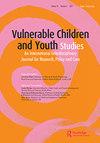Has the sustainable development goal of reducing the proportion of youths not in education, employment or training by 2020 been met in Africa?
IF 0.7
Q4 FAMILY STUDIES
引用次数: 0
Abstract
ABSTRACT The consequences of growing up deprived of critical resources vital for well-being and human development jeopardises the fulfilment of potential in the lives of youths, thereby creating hurdles in access to education, training or the labour market, consequently leading to higher rates of youths that are not in education, employment or training (NEET). Sustainable Development Goal (SDG) 8, Target 8.6 aimed to substantially reduce the proportion of NEET by 2020. This study aims to find out if the SDG’s target of substantially reducing NEET by 2020 was fulfilled in Africa. If not, what are the factors affecting NEET in Africa? Descriptive statistics, Ordinary Least Squares and Two-Stage Least Square methods have been used. Results indicate that Africa stalls behind and is far from reducing NEET. Self-employment is the highest employer of youths and conversely exacerbates the rates of NEET. Gender parity index, access to the internet and irrigation services reduce NEET rates. Good institutional quality is critical because institutions are policymakers and service providers. Policies should support literacy, entrepreneurial and digital skills training to boost self-employment. Child marriage should be prohibited. Youths can be supported by securing funds from indirect taxes. Policymakers should work closely with youths to understand their needs and capacities.非洲是否实现了到2020年减少未接受教育、就业或培训的青年比例的可持续发展目标?
在成长过程中被剥夺了对福祉和人类发展至关重要的关键资源的后果,危及青年生命中潜力的实现,从而在获得教育、培训或劳动力市场方面造成障碍,从而导致更高的青年不接受教育、就业或培训(啃老族)的比例。可持续发展目标8具体目标8.6旨在到2020年大幅降低啃老族的比例。这项研究的目的是找出可持续发展目标到2020年大幅减少NEET的目标是否在非洲实现。如果不是,影响非洲啃老族的因素是什么?描述统计,普通最小二乘法和两阶段最小二乘法已被使用。结果表明,非洲落后了,远远没有减少NEET。自营职业是年轻人的最大雇主,反过来又加剧了啃老族的比率。性别均等指数、互联网接入和灌溉服务降低了NEET比率。良好的制度质量至关重要,因为机构既是政策制定者又是服务提供者。政策应支持扫盲、创业和数字技能培训,以促进自营职业。童婚应该被禁止。青年人可以从间接税中获得资金支持。决策者应与青年密切合作,了解他们的需求和能力。
本文章由计算机程序翻译,如有差异,请以英文原文为准。
求助全文
约1分钟内获得全文
求助全文
来源期刊

Vulnerable Children and Youth Studies
FAMILY STUDIES-
CiteScore
1.90
自引率
0.00%
发文量
33
期刊介绍:
Vulnerable Children and Youth Studies is an essential peer-reviewed journal analyzing psychological, sociological, health, gender, cultural, economic, and educational aspects of children and adolescents in developed and developing countries. This international publication forum provides a much-needed interdisciplinary focus on vulnerable children and youth at risk, specifically in relation to health and welfare issues, such as mental health, illness (including HIV/AIDS), disability, abuse, neglect, institutionalization, poverty, orphanhood, exploitation, war, famine, and disaster.
 求助内容:
求助内容: 应助结果提醒方式:
应助结果提醒方式:


